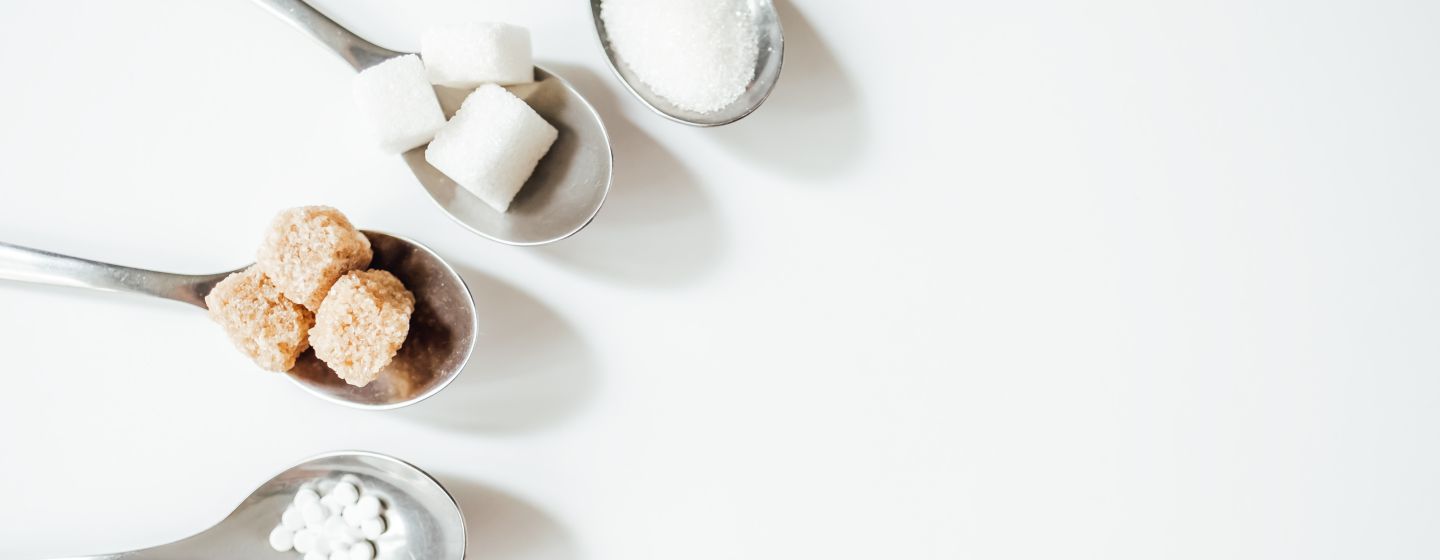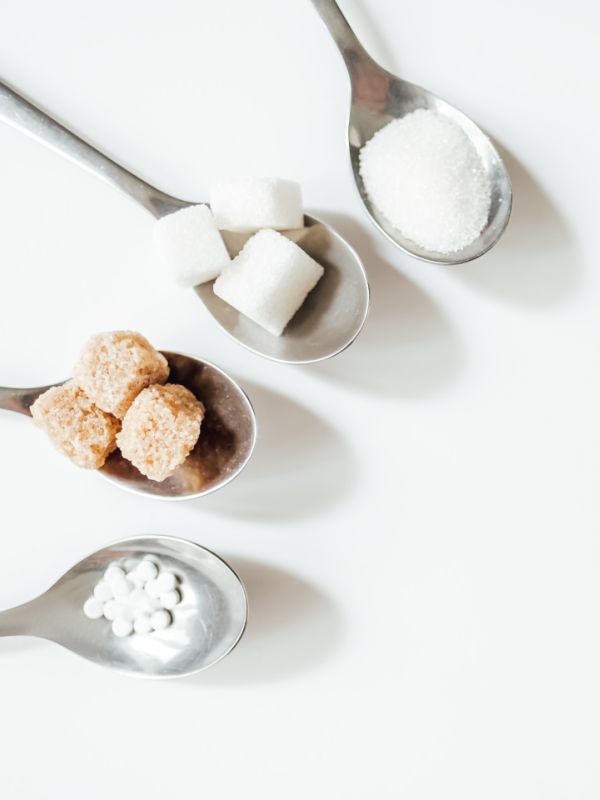If you’re looking to control your blood pressure by altering your diet, sugar substitutes are a good place to start. Too much sugar can raise blood pressure, as well as heighten your risk of obesity and diabetes, so cutting down your intake is one of the fastest steps you can take to improve your blood pressure and overall health.
Well known sugar alternatives include aspartame, sucralose, saccharin and stevia, but what effects do these have on your blood pressure? Researchers are still exploring the relationship between sugar substitutes and blood pressure, as well as overall health. We’ll uncover what we know so far.
Sugar substitutes
The most common type of sugar is sucrose, followed by fructose and galactose, all of which can be quickly absorbed into the body and used as energy.
Sugar substitutes differ by providing a sweetness with fewer or no calories, helping to control weight. However they can have side-effects, often affecting digestion and, according to some studies, blood pressure. In 2022 a BMJ study concluded that artificial sweeteners caused a 9% higher risk of any type of cardiovascular problem (including heart attacks) and an 18% greater risk of stroke.
Diet sodas and artificially sweetened beverages are the biggest source of artificial sweeteners in the average person’s diet, though such sweeteners are also commonly found in sugar-free gum and desserts.
Sugar substitutes should generally be consumed alongside conventional sugars – never entirely instead of. Without sugar the body goes into starvation mode, leading to symptoms such as headache, fatigue and brain fog. All this is to say, the body needs sugar – just not too much. The World Health Organization (WHO) recommends keeping total sugar intake to less than 10% of the total daily calorie intake, so if you keep it around that proportion you’re doing well.
Sugar substitute examples
- Aspartame: This is found in soft drinks, desserts, breakfast cereals and chewing gum. It is 200 times sweeter than sugar, so you only need a small amount to sweeten food. Research is divided on how effective aspartame is for stimulating weight loss. Some studies indicate it can slow down metabolism, which can cause you to gain weight. Too much has been associated with a higher risk of strokes, while it’s also been linked with headaches, seizures, migraines, irritable moods, anxiety, depression, and insomnia.
- Sucralose: Like Aspartame, Sucralose has no calories and is sweeter than sugar, meaning it can be effective in helping you control your weight in small quantities. However some reports have linked the sugar substitute with a higher risk of heart disease, while a small study found that sucralose elevated blood sugar levels in new users who were already overweight.
- Saccharin: Like the two mentioned above, Saccharin is a man-made sweetener. Unlike them it was banned in Canada until 2016 because it was falsely thought to cause bladder cancer. The sweetener is commonly used in unstandardized canned fruit, chewing gum, desserts and toppings, fruit spreads and jams, alcoholic beverages, and table-top sweeteners.
- Stevia: Stevia is a natural sweetener that can lower high blood pressure for people with hypertension, though it generally doesn’t affect those with normal or mildly elevated blood sugar levels. Some dislike its somewhat bitter taste.
- Sugar alcohols, like xylitol, erythritol, and others: They likely don’t spike sugar alcohol or insulin levels, but they can cause digestive distress if consumed in excessive amounts. 2023 research linked erythritol with heart disease and stroke, though that was from a very small study involving just eight participants.
- Acesulfame potassium (aka Acesulfame K): This sweetener is heat stable and has a long shelf life, making it a good choice for baking. However, a BMJ study suggested it heightens the risk of coronary artery disease risk.
- Monk fruit: A sweetener made from the extract of a small green melon native to southern China. It does not raise blood sugar levels, but it can cause side effects like gas, bloating or allergic reactions. Some people are turned off by its aftertaste, while it’s more pricey than other sweeteners.
- Agave: Can be used in cocktails, baked, or instead of a syrup, though excessive amounts can lead to gastrointestinal issues like gas, bloating, and stomach pain.
A common thread with these sweeteners is they are successful in providing sweetness without the caloric content of sugar, making them largely attractive for weight control. However they come with varying side-effects – digestive issues is a recurring theme, while other effects seem to differ based on the sweetener and the study.
Other sugars
- Maple syrup: The Canadian staple has a more measured impact on blood sugar than refined sugar due to its vitamins, minerals, and antioxidants. It also contains a compound that slows down its blood sugar absorption, which may be good for people with diabetes. Darker syrup tends to have more nutritional benefits than lighter products. Can still cause blood sugar to spike.
- Coconut sugar: Is still high in calories, but contains minerals like potassium and magnesium that may help regulate blood pressure and has been shown in a pilot study to lower systolic blood pressure and arterial stiffness in older adults. However it can cause inflammation in high quantities.
- Brown rice syrup: It comes in a syrup-like form and is produced by exposing cooked rice to enzymes that break down starches and turn them into smaller sugars. It is high in glucose, which can cause blood sugar to spike, while it can contain trace amounts of arsenic.
- Blackstrap Molasses: This is lower on the glycemic index than conventional sugars, meaning it raises blood sugar levels more slowly. In terms of negative effects, it can cause digestive issues and it still has high sugar content.
Why sweeteners affect blood pressure
Gut microbiome
Some studies suggest sweeteners can influence the gut microbiome, which plays a crucial role in metabolism and overall health. This is important, as disruptions in the gut microbiome balance have been linked to metabolic disorders like insulin resistance, obesity, and increased blood pressure.
Vascular Health
Research undertaken on rodents indicates that sugar substitutes can affect the inner lining of blood vessels, known as the endothelium, which plays a critical role in regulating blood pressure through release of paracrine signaling molecules, such as nitric oxide (NO) and prostacyclin. Disruption of endothelial function could therefore increase the risk of cardiovascular disorders relating to blood pressure.
Sign up for the newsletter and get the most up-to-date information on how to keep your cardiovascular system strong!
What do the studies say?
A 2023 study raised concerns about erythritol, a sugar alcohol commonly used as a sweetener. It found that higher levels of erythritol in the blood were associated with an increased risk of major cardiovascular events such as heart attacks and strokes. This is due to increased platelet reactivity, leading to a higher risk of clotting, instead of changes in blood pressure.
There are also studies that suggest high consumption of sugar-sweetened and artificially sweetened beverages leads to increased blood pressure. Rodent models suggest long term consumption of sugar substitutes does not directly impact upon cardiovascular health. However, it can heighten the risk of suffering from an irregular and rapid heart rhythm. That said, more research is needed, and the study was completed on rodents rather than humans.
There are also research papers suggesting that sugar substitutes have minimal impact upon the body. For instance, though it is well known that stress has an adverse effect on our cardiovascular system, a 2020 study found there was no difference in blood flow through vessels during stress tests after the consumption of water, artificially sweetened water or sucrose-sweetened water.
Individual differences matter
Conflicting evidence suggests the effects of sugar substitutes are not clear cut, and more research is needed. Consuming large quantities of artificial sweeteners like saccharin and sucralose often seem to cause digestion issues, but the effects on blood pressure seem to be milder.
Data can differ owing to small sample sizes, as well as characteristics of those being tested, including sex, genetics and BMI. Other factors can also be at play when it comes to health, for example how much salt the person is consuming and the level of exercise they’re undertaking.
Should you be concerned about sugar substitutes’ effect on blood pressure (BP)?
Based on today’s research, sugar substitutes only seem to mildly affect blood pressure, if at all. In the vast majority of cases consuming them in moderation seems to be a healthy option.
Not all substitutes are made the same, with aspartame being linked to strokes and acesulfame potassium with a higher risk of coronary heart disease, but many of these studies need further research. You probably don’t need to avoid either of the aforementioned sweeteners!
One thing is for sure, it’s worth integrating some non-conventional sugars into your diet to improve your blood pressure. Even maple syrup seems to have its benefits compared to refined sugar, so consider diversifying your sugar intake to lower your blood pressure.
Disclaimer: This article is for educational purposes only and does not contain, nor replace, medical advice. Consult your doctor before making any changes to your diet or lifestyle.
Sources:
Sugar substitutes: New cardiovascular concerns?, Harvard Health Publishing, January 1 2023, https://www.health.harvard.edu/heart-health/sugar-substitutes-new-cardiovascular-concerns
WHO calls on countries to reduce sugars intake among adults and children, World Health Organization, 4 March 2015, https://www.who.int/news/item/04-03-2015-who-calls-on-countries-to-reduce-sugars-intake-among-adults-and-children
Aspartame, Government of Canada, 22 August 2025, https://www.canada.ca/en/health-canada/services/food-nutrition/food-safety/food-additives/sugar-substitutes/aspartame-artificial-sweeteners.html
Ragi, M.E., El-Haber, R, El-Masri, F, Obeid, O, The effect of aspartame and sucralose intake on body weight measures and blood metabolites: role of their form (solid and/or liquid) of ingestion, National Library of Medicine, 7 September 2025, https://pmc.ncbi.nlm.nih.gov/articles/PMC9301525/
Debras, C., Sellem, L., Druesne-Pecollo, N., et al. (2022). Artificial sweeteners and risk of cardiovascular diseases: results from the prospective NutriNet-Santé cohort. BMJ, 378, e071204. https://www.bmj.com/content/378/bmj-2022-071204
Choudhary, A, Lee, Y, Neurophysiological symptoms and aspartame: What is the connection?, National Library of Medicine, 15 February 2017, https://pubmed.ncbi.nlm.nih.gov/28198207/
What You Should Know About Sucralose and Diabetes, healthline, 13 August 2020, https://www.healthline.com/health/diabetes/sucralose-and-diabetes#effects
Saccharin, Government of Canada, 4 May 2017, https://www.canada.ca/en/health-canada/services/food-nutrition/food-safety/food-additives/sugar-substitutes/saccharin-artificial-sweeteners.html
5 Natural Sweeteners That Are Good for Your Health, healthline, 14 July 2023, https://www.healthline.com/nutrition/healthy-natural-sweeteners#1-Stevia
Witkowski, M, Nemet, I, et al. The artificial sweetener erythritol and cardiovascular event risk, 27 February 2023, https://www.nature.com/articles/s41591-023-02223-9
Why Everyone’s Going Mad for Monk Fruit, healthline, 10 February 2023, https://www.healthline.com/health/food-nutrition/monk-fruit-health-benefits
Health Benefits of Agave, Health, 27 August 2025, https://www.health.com/agave-benefits-8651999
Carlini, N, Romanowski, S, et al. Coconut sugar derived from coconut inflorescence sap lowers systolic blood pressure and arterial stiffness in middle-aged and older adults: a pilot study, National Library of Medicine, 1 March 2023, https://pubmed.ncbi.nlm.nih.gov/36656985/
Méndez-García, L. A., Bueno-Hernández, N., Cid-Soto, M. A., et al. (2022). Ten-Week Sucralose Consumption Induces Gut Dysbiosis and Altered Glucose and Insulin Levels in Healthy Young Adults. Microorganisms, 10 (2), 434. https://doi.org/10.3390/microorganisms10020434
Takeuchi, T., Kubota, T., Nakanishi, Y. et al. (2023). Gut microbial carbohydrate metabolism contributes to insulin resistance. Nature 621, 389. https://doi.org/10.1038/s41586-023-06466-x
Kim, Y., Je, Y. (2016). Prospective association of sugar-sweetened and artificially sweetened beverage intake with risk of hypertension. Archives of Cardiovascular Diseases, 109 (4), 242. https://doi.org/10.1016/j.acvd.2015.10.005
Cros, J., Bidlingmeyer, L., Rosset, R. et al. (2020). Effect of nutritive and non-nutritive sweeteners on hemodynamic responses to acute stress: a randomized crossover trial in healthy women. Nutr. Diabetes, 10, 1. https://doi.org/10.1038/s41387-019-0104-y
How Artificial Sweeteners Disrupt the Gut Microbiome, Or Do They?, Medical News, 31 March 2025, https://www.news-medical.net/health/How-Artificial-Sweeteners-Disrupt-the-Gut-Microbiome-Or-Do-They.aspx






